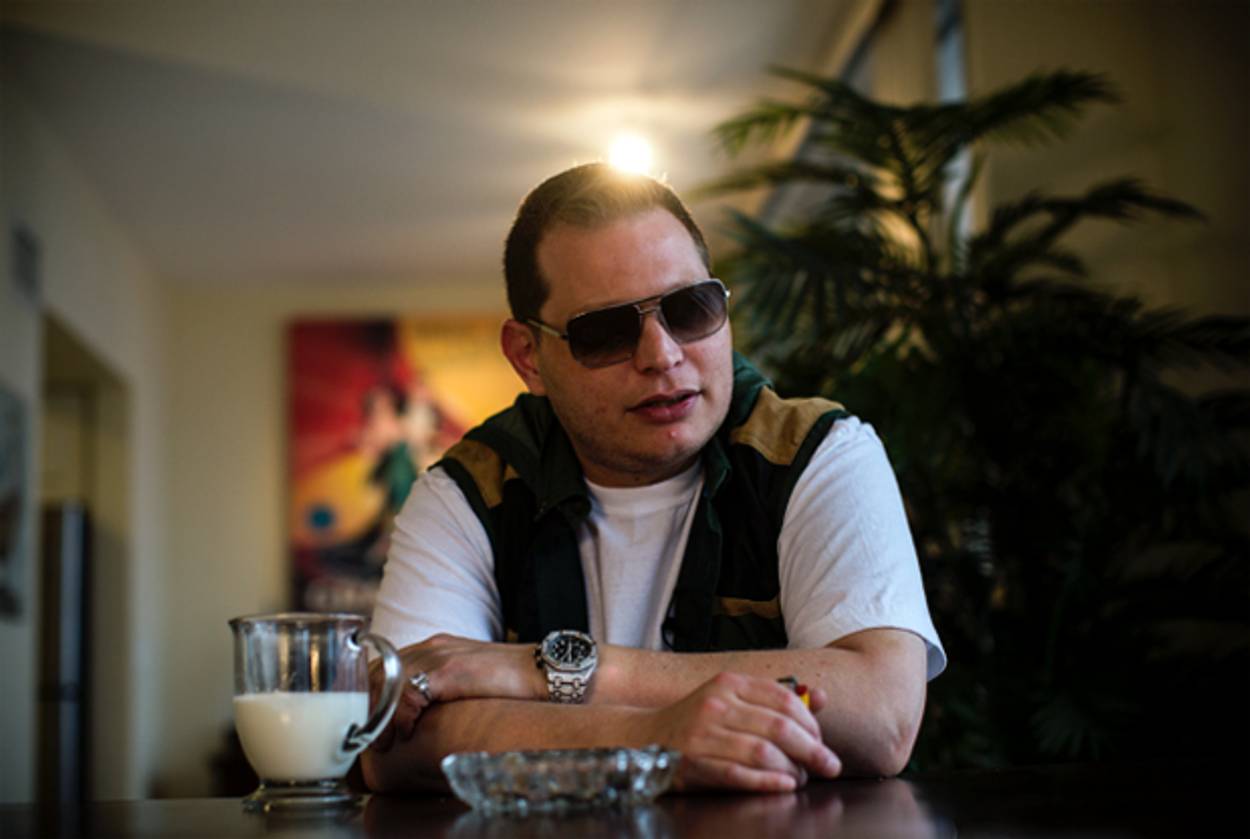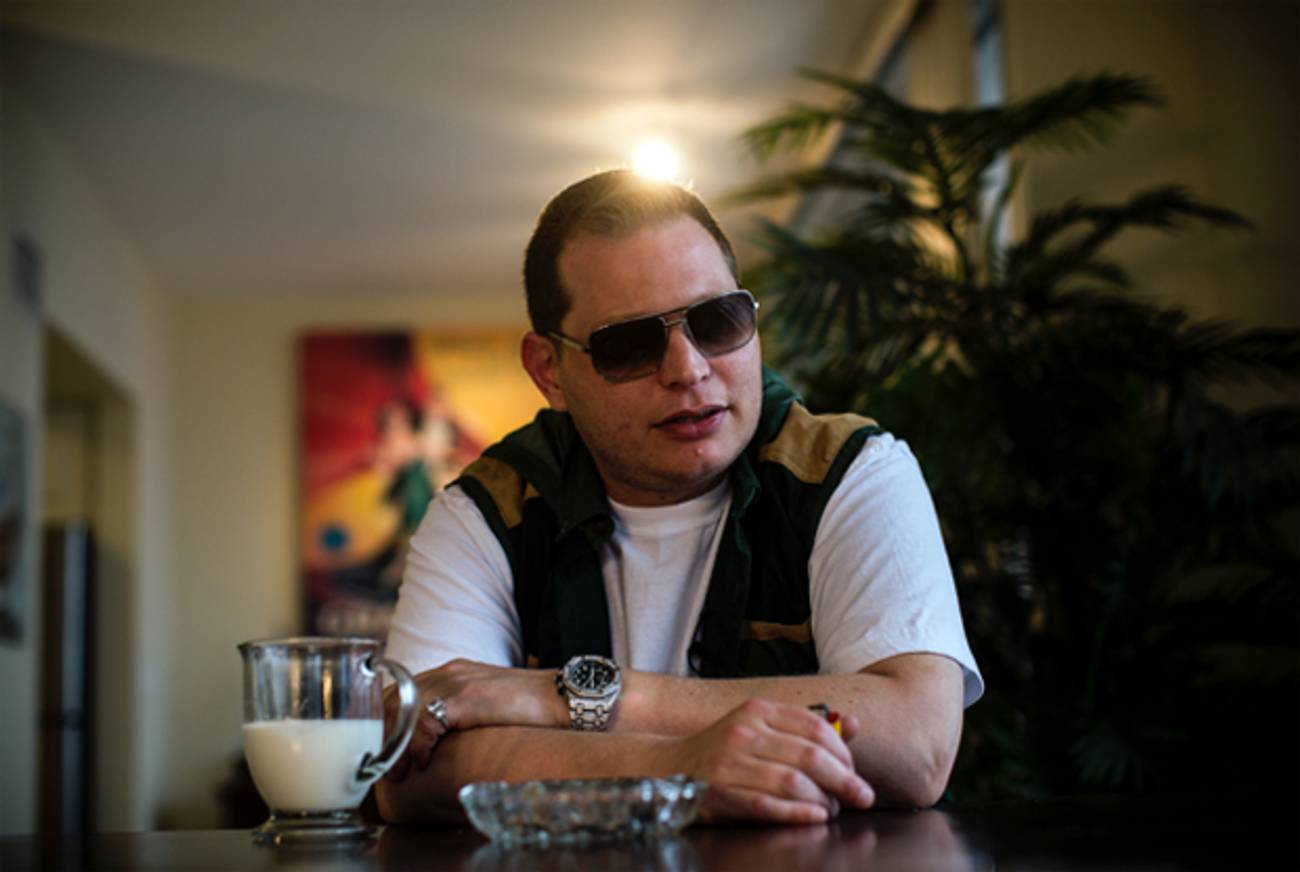Scott Storch’s Yiddishkeit
After an epic rise and fall, the hip-hop producer is embracing his haimish side




The moment I met Scott Storch I knew we were going to hit it off—this despite Storch’s lingering reputation as one of the thornier characters in hip-hop. But how could I not like him immediately, when, standing in the DJ booth of the South Beach nightclub Mansion, a pair of Beats by Dre headphones around his neck, he greeted me with a fist bump and a hug: “Yo, what’s good, bubeleh?”
Storch, the super-producer and composer who in his early thirties famously squandered his $70 million fortune on a jaw-dropping lifestyle of luxury—and serious drug habit—now appears to be a refreshed and reformed man. Puffing on a Marlboro Red in the DJ booth, the 40-year-old Storch was focused and alert, having substituted lines of cocaine for Coca Cola on ice. He may have written and produced some of the biggest hip-hop and pop hits hits of the last decade, but he’s now adopted a new persona: electronic dance music (EDM) singer.
It might be hard to envision a 40-year-old Jewish guy blowing up as the next big thing in the pop-electronica music scene. But if Storch’s debut EDM single, “Your Light,” becomes a hit, it will be on the strength of its undeniably catchy pop hook. Storch told me that some of his infectious melodies—The Roots’ “Baby You Got Me” or Mario’s “Let Me Love You”—often come to him at the most unexpected times. “The hook for “Your Light” hit me while I was driving on 95,” he told me. “I heard this melody in my head, so I called up this girl: ‘Yo, I’m going to leave you a voicemail message—don’t pick up!’ And there I was in the car, driving, recording this thing.”
Storch exhaled a thin plume of cigarette smoke, confident that he’s now ready to unveil his second act in the music business. “They say the song is the horse the artist rides home on,” he says. “Well this is my fuckin’ horse.”
As Storch’s reputation as a prolific hit-making machine was tarnished by the endless crop of tabloid stories of his erratic behavior, it became easy to forget his virtuoso musicianship and work ethic. But at his peak, Storch was cranking out chart-toppers in genres as diverse as hard-core West Coast hip-hop and sugary pop, producing smashes for superstars like Justin Timberlake and Christina Aguilera. A generation of millennials grew up with Storch’s hits as their cellphone ringtones, often not knowing he was the musical mastermind behind the scenes on songs like Timberlake’s “Cry Me A River,” Fat Joe’s “Lean Back,” and 50 Cent’s “Candy Shop,” which was ranked the most popular ringtone of 2005.
A middle-class Jewish kid from Long Island, Storch dropped out of high school and was on a path to becoming a court reporter like his father when he was discovered—sleeping on the floor at a garage studio in Philadelphia—by the original members of The Roots, who were recording their debut Organics album. Still only 16, and now the only white member of hip-hop’s best live band, Storch co-wrote and played on all The Roots’ earliest records, soon embarking on a grueling touring schedule. On a trip to L.A., his friend, the Philadelphia rapper Eve, introduced Storch to Dr. Dre, who was then in the process of recording what would become the producer and rapper’s 2001 album.
Standing in the kitchen of his condo on the Hollywood Beach coast, I recently played Storch the song “Big Egos,” one of the album’s most memorable songs, on my iPhone’s speaker.
“Yo, hear that fuckin’ simplicity?” he asked, nodding. “That’s the first record I ever did for Dre. It was a groove thing.”
“That was the song that catapulted my relationship with him,” Storch explained. “After that, I came up with those trill riffs for the song ‘Still D.R.E.’”
“Still D.R.E.,” co-written by Jay-Z and featuring vocals from Snoop Dogg, sold more than four million copies. It also rejuvenated Dre’s career in hip-hop, and suddenly the young keyboardist for the Roots found himself in the big leagues—and the big money. Before long Storch could command nearly $100,000 for his writing and production skills. His over-the-top lifestyle, featuring a Maybach, rare Ferraris, a 117-foot yacht named Tiffany, and a $20-million Greco-Roman mansion, soon became the stuff of legend.
But by 2009, he’d blown it all: $70 million down to gornisht. The bankruptcy filing—and myriad lawsuits—was Storch’s business nadir, and presumably the end of his hit-making career. At rock-bottom, he entered a rehab facility, disappearing from the music business. He told me he learned a lot about himself in rehab, and came out “a changed man.” But in the lighting-fast era of Twitter, Instagram and Facebook updates, Storch also became a forgotten man.
Inside his quiet, luxurious condo complex on Hollywood Beach, I watched as Storch indulged a decidedly bizarre snack: kosher pickles from the jar, a mug of milk, and puffs on his Marlboro Red. He reflected on his simpler life, which he describes as living “within my means.” He’s focusing on his three children, and even the joys of his new puppy, Marley (named for the iconic Jamaican superstar by way of an Instagram contest among fans).
He gazed out the window at the crashing surf, and seemed almost vulnerable—I could hardly believe this was the same man who so recently had become infamous for his supposed arrogance and blatant disrespect for record executives and colleagues. It was Storch’s unabashed Yiddishkeit that took me most by surprise. He’s the first hip-hop figure I’ve ever encountered who can casually drop old-school Yiddish words like naches into conversation without it seeming like an affectation—more Walter Yetnikoff than MC Serch. Storch and his manager, Matt Buser, explained that they’re currently in negotiations for a line of Scott Storch signature aviator sunglasses. “No joke,” Storch told me, “we’re gonna call them shpilkes.”
Nearby, at his Hollywood recording studio, surrounded by walls full of platinum plaques commemorating his work with Beyoncé, Aguilera, and Dr. Dre, I noticed that every single door frame in the place had a mezuzah affixed to it. “We even had a rabbi come down and say the blessing as he mounted them,” Storch told me, nodding. “But he was a cool young rabbi—he had skills. We put him on the mic and yo, kid could spit.”
Related: Action Bronson Is My Grandfather
Hot 97’s Morning Jew: An Interview With Peter Rosenberg
The Deep Jewish Roots of Kanye West’s Awesome ‘Blood on the Leaves’
Douglas Century is the author and coauthor of numerous bestselling books including Hunting El Chapo, Takedown, Under and Alone, Brotherhood of Warriors and Barney Ross: The Life of a Jewish Fighter, a biography in the Nextbook Press Jewish Encounters book series.